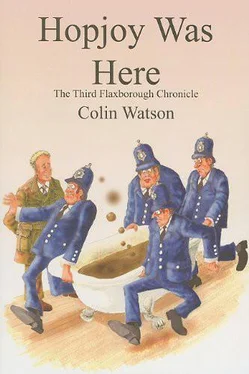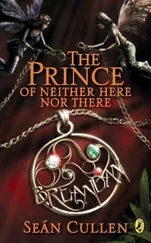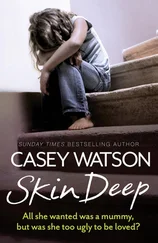“What’s that got to do with it?”
Mr Barraclough, in his agitation, nearly retorted: “Opening time, of course,” but he just managed a more seemly formula. “Six is the licensed hour for non-residents.”
Love was unmoved. “That doesn’t matter. I’ve locked the door. Nobody’s going to get a fright.”
He sat down in a chair near the lift. From it he commanded views both of the receptionist—of her upper parts, anyway; for the moment Love found sufficient the mere memory of his earlier glimpse of those portions he had appraised, after his first surprise, as ‘snazzy’—and of the main hotel entrance.
Through that entrance at exactly a quarter past six walked Inspector Purbright, Major Ross, Pumphrey, and the county police surgeon. Behind them, an ambulance drew across the forecourt in a half circle and backed somewhere out of Love’s line of vision.
The sergeant rose and hurried up to Purbright. His face had lost a good deal of its usual expression of luminous equanimity. Purbright gave him a concerned glance. “Don’t look so woebegone, Sid; they don’t charge you just for being here.”
“I’m ever so sorry, sir, honestly...”
“Nonsense. You had nothing whatever to do with it. If anyone’s to blame, it’s me. Now then...” Purbright looked about him—“I suppose we’d better view the remains. Where’d you put them?”
“I didn’t put them anywhere. They’re...he’s just sitting there in the lounge.”
Purbright took the key Love offered. He paused. “By the way, where’s the girl?”:
“She’s up in their room.”
“Upset?”
Love looked uncertain. “Well, shocked of course; she was there when it happened. But not hysterical or anything.”
Purbright beckoned the others. He unlocked the door.
On the far side of the long room, with its indigo ceiling, pearl-grey walls and scallop-backed armchairs panelled with alternate plum and yellow, sat a solitary figure. It seemed to have been waiting for them there a long, long time. Slumped a little sideways in the big, embracing chair, it stared stupidly as if just awakened from a doze.
In front of the chair was a low, kidney-shaped table bearing a tray set with a teapot, milk, sugar and two cups and saucers. One eye of the corpse seemed directed at the pot; the other fixed upon the advancing party, defying them to ask for a share in the refreshment.
The police surgeon bent over the body, lightly touched eyelids, wrist and neck, and stood back. With a pencil he pointed to a spot just above the dead man’s collar, an inch or so to the left of his windpipe. “There’s the puncture,” he said to Purbright. “That little bluish mark.” They all drew close and peered, heads together, at the throat of the dead Mr Periam.
Purbright made a rapid survey of the table top. “Where’s the lighter, sergeant?”
“On the floor, sir. There, by his left foot.”
Very cautiously, Purbright picked it up and held it in his open palm. “You’d better tell us just what happened. From the beginning.”
Love gave a frown of concentration. “Well, I’d taken the thing round to everyone I could think of who knew Mr Hopjoy—George Tozer first, then one or two of the people in Beatrice Avenue. They didn’t recognize it, so I tried a few licensees in town. I hadn’t much luck with them, either. Then I thought that Mr Periam would be the best bet, even though it meant coming right out here. Well, they’d lived in the same house, after all. He recognized it at once. ‘That’s old Brian’s,’ he said. ‘Where did you get hold of it?’ ”
“They were sitting here, were they—Mr and Mrs Periam?”
“That’s right, sir. The girl at the desk told me to come through. They were quite friendly. Asked me to sit down—I sat in that chair over there—and I took the thing out of the envelope. I hadn’t let any of the other people actually handle it—well, I understood it was evidence, in a way—but Mr Periam leaned across and took it before I could stop him. He said, ‘Oh, yes, I’ve seen this lots of times’ and started to try to get it to light—you know, as anyone might out of curiosity. He kept on pressing the top. It didn’t even spark, though. Then he spotted that little trigger thing on the side and pushed it with his thumb nail. There was a sort of hiss—very sudden, with a bit of a pop about it—and he dropped the lighter and felt the front of his neck as if he’d been stung. He said, ‘That’s a queer do’—oh, three or four times; he kept on saying it and rubbing his neck. Then after a bit he couldn’t seem to get his breath and just sat there staring and choking. Mrs Periam ran out for help while I held him. But within a minute or two he’d had it.”
Purbright turned to Ross. Gingerly, but knowledgeably, Ross took the lighter between thumb and forefinger and examined it. “Very neat. Czechoslovakian, probably. I need hardly say that our people aren’t issued with quite this sort of thing.”
“Naturally not. How did Hopjoy get hold of it, though?”
“Won it from one of their people’s baggage, perhaps. Or he could have bought it. As a souvenir, you know. Some of their chaps are hopelessly mercenary.” He dismissed the point with a shrug. “See that little hole? The thing’s a sort of airgun, really. Primed with the plunger and set off with this catch. Tiny cyanide pellets, I expect. That’s the usual drill.”
Pumphrey heard the exposition with marked disapproval. He put his hand on Purbright’s sleeve. “You’ll see that this contrivance doesn’t get bandied around, won’t you, inspector? It would be most undesirable, security-wise, if...” He broke off, looking worried.
Purbright appeared not to have been listening. He gazed thoughtfully at the dead man’s face. It looked puffy, stupid, impotent. Purbright felt constrained, as he often did, to attempt the loan of some little dignity to one who had lost all his own. “You know,” he said quietly to Ross, “be would have done awfully well in your line.”
“He’d have needed a course in booby-traps first.”
“No doubt. But that”—Purbright weighed the lighter in his hand—“was just bad luck. Booby-traps, in a much more subtle sense, were his forte. The criminal who proves too clever is common enough; but I must say I’m enormously impressed with a criminal who is able to calculate exactly to what degree the police will prove too clever, and who arranges his crime accordingly.”
Two ambulance men and a constable had entered and were standing hesitantly near the door. Purbright motioned them over. Like tactful, proficient club stewards called to remove a member regrettably immobilized by port, they advanced noiselessly upon the corpse, tweaking up their sleeves. The doctor nodded and departed.
The others moved to a table farther away. Over his shoulder, Love stole a last glance at Periam before a sheet rendered him mere freight.
“It’s funny,” he said, “but he doesn’t look the type to smash a bloke’s head in with a hammer.”
“He didn’t,” said Purbright. “I think we’ll find that strangling was the method, actually. Warlock should enjoy himself looking for skin fragments on Periam’s chest expander. ‘Doing his exercises’ was how Miss Cork put it. Now we can add it to our collection of wisdom after the event.”
“You mustn’t be too hard on yourself, Purbright.” Ross delicately scraped a few flakes of carbon from the bowl of his pipe with a reamer fashioned (as he could have disclosed) from a secret Skoda steel tool and capable, when keyed to the spindle of an ordinary electric shaver, of grating armourplate away like cheese.
“I’ll try not to be,” Purbright said humbly.
Ross looked up. “There’s one question that hasn’t been answered. And it’s so important that I’m going to put it frankly to you here and now. For whom was Periam working?”
Читать дальше

![Fredrik Backman - Britt-Marie Was Here [Britt-Marie var här]](/books/61260/fredrik-backman-britt-marie-was-here-britt-thumb.webp)










